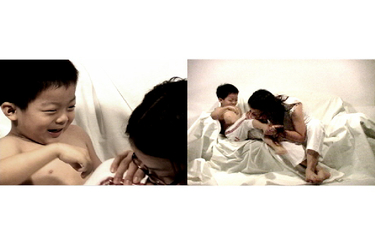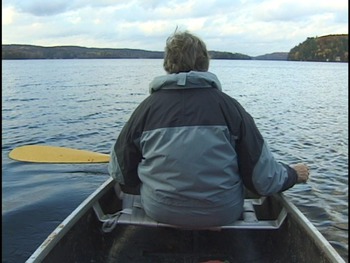curated screening
(on-demand exhibition)
at Vtape
30.01 – 19.02.2009
Part of Curatorial Incubator v.6: The Dark Arts: Magic and Intuition.
Where the Wild Things Are, the classic picture book by Maurice Sendak, speaks to a child’s desire to be one with their parent, to consume and be consumed, despite the impossibility of this merger. It’s a story of wild and youthful imagination and its eventual demise as the adult world seeps in. It’s also about a struggle to be heard by the adult world, to be understood and recognized. In the story, a young boy named Max has been sent to his room without supper. Through an imaginative projection he turns his bedroom into a fantastic land where wild things dwell. Max colonizes the wild things, becoming their king. After a joyful, but ultimately unfulfilling reign, he leaves for home. Traversing his fantasy back to his room he finds his dinner, brought up by a now absent and never pictured mother. The last words of the story, “it was still hot,” referring to his lonely meal, is the only tenderness in the book. The world presented in Where the Wild Things Are is one where children and adults are at odds. “Sendak dramatizes what children always already know to be true and only adults find difficult to remember: childhood is often a terrible, confusing time, made more so by an adult-centred ideology that implicitly requires the child to ignore his felt experience of this truth.” Max, in taming the wild things of his fantasy, has ‘othered’ and conquered himself to fulfill the adult demands placed on him. Sendak presents a dialogue breakdown between adult and child, while simultaneously highlighting that “the child does have a life inside of him or her that, while it lasts, is as big and mysterious as the universe itself.”
The three videos in the programme Where the Wild Things Are approach parent/child dynamics with an eye for their complexity, dialogue miss-functions, and psychic traumas. The ‘Wild Things’ are not wholly lost; they lie beneath the surface to be accessed, summoned in the service of love, mourning, and transference.
Programme:
Who’s Listening? 5, Tseng Yu-Chin, 2003, 24:20
five more minutes, Dena DeCola & Karin E. Wandner, 2005, 17:15
Parenthesis, Mary J. Daniel, 2003, 3:55
*Press release available here.
*Essay available here.

Who’s Listening? 5, Tseng Yu-Chin, 2003

five more minutes, Dena DeCola & Karin E. Wandner, 2005, still photo credit: Star Barry

Parenthesis, Mary J. Daniel, 2003